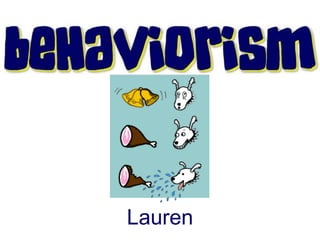
Eichberg behaviorism
- 1. Lauren
- 2. How we understand human behavior through prediction and control Learning through positive and negative rewards
- 3. 1849-1936 Became who he was by using dogs in an experiment Taught dogs to salivate when they heard a bell
- 4. Classic Conditioning Stimulus=Food, Reflex=Salivation Provided stimulus, achieved his desired reflex Dogs learned to associate bell with food, began to salivate with only ringing of bell and no food
- 5. 1904-1990 Operant Conditioning Stimulus=Behavior, Response=Reward Rewarding when the desired behavior is seen Pigeons Taught them how to dance
- 6. Believed people shape behavior based on positive or negative rewards Good action=good reward
- 7. 1925- Social Learning/Social Cognitive Theory Focused on motivational factors that contribute to behavior
- 8. Observational Modeling Mimicking the behavior observed Self-efficacy- motivate to learn Imagery- analyze person’s personality through: Environment Behavior Person’s physiological processes
- 9. With Technology and behaviorism: Use programs that are related to a subject If the student get’s answer correct, extra credit points rewarded Without Technology Games in class, and rewards for correct answer
- 10. With technology Play games online to try to receive extra credit points Without technology Participate in classroom activities to try to earn extra credit
- 11. Overall, behaviorism is a great way to teach Reasons why I would use Behaviorism: Reward students for good behavior Reward students for correct answers Punishment for poor behavior
- 12. Sources Shelly, Gary B., Genda A. Gunter, and Randolph E. Gunter. Teachers Discovering Computers. N.p.: Library of Congress, 2010. Print. Pictures from: www.google.com